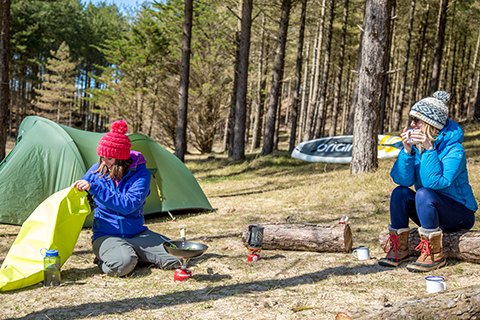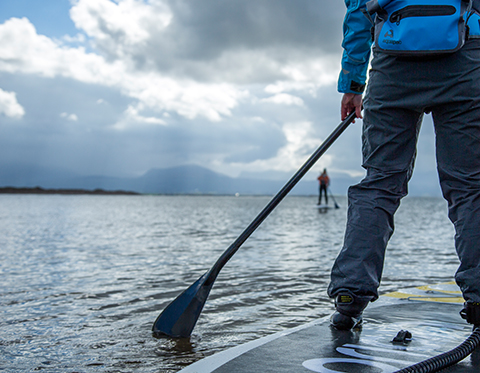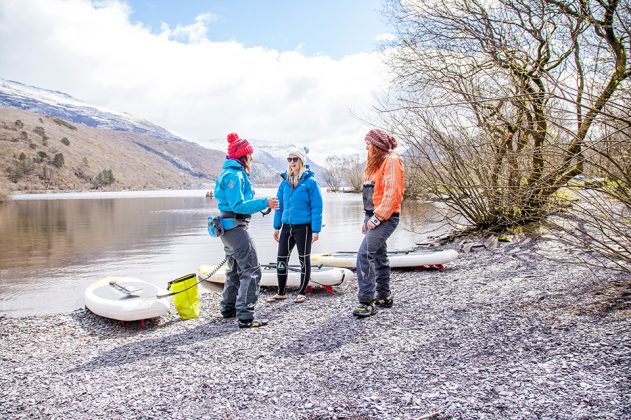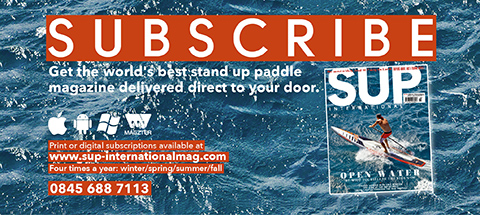GET PSYCHED #1 –
PLAN AN EXPEDITION
With – Sian Sykes
Photo – Two for Joy
I simply love expeditions; I enjoy the real sense of adventure, experiencing different cultures, immersing myself in wilderness and feeling like a true explorer! The outside is a playground full of potential; be it journeying on lakes, canals or on the sea. That’s why sup is so perfect, you have the freedom to take your board and go off on exciting expeditions: have board, will travel.
My advice for anyone wishing to go on an expedition is to firstly identify your aspirations. Is it for example to explore a different country? A journey around a remote island? To cruise along a stretch of canal? To see certain wildlife and document it, or simply to find a quiet spot to sleep under the stars? Establish what your expedition aim is, because everything else hinges around it. But before you pack your bags and jump off the edge of the planet, there are a number of things to consider.

Planning and Preparation
With all expeditions you need to invest time and effort in the planning and preparation phase. I study maps to identify a route based on my aims. I look for potential risks, note the launching and exiting points, as well as escape routes along the way. I also mark suitable accommodation spots. It allows me draw up a route card, which weather information and if appropriate tidal information, feeds into. I recommend you be liberal with your timing estimates and ensure you factor a contingency plan. I often find with expedition life that plans alter due to a number of things such as the weather and issues with logistics. If you have planned your expedition thoroughly, you can easily implement a plan B. It’s about being fully prepared so you are not fazed if an issue arises.
“ Establish what your expedition aim is, because everything else hinges around it ”
Weather – Having access to weather forecasts is fundamental. When you are informed, you can prepare and create a plan. According to the direction and strength, will you able to take advantage of the wind on your tail or will you have to wait for the wind to die down before you can continue? Furthermore, how will you gain access to weather forecasts whilst you’re out in the cuds?
Access – Do you need to ask for permission or get a permit to launch or camp?
Type of water – Are you skilled to deal with different water conditions you may face on your journey? Will you be facing any tidal races or gnarly white water? It’s all about preparing your expedition based around your ability.
Communication – How are you going to communicate with the emergency services if the need arises? I use VHF, 2 way radio and mobile phone. Also you need to consider how you will access your comms.
They’re no good to you if they are all stashed away in a dry bag on your board and you become separated…
Accommodation – Where are you going to stay on your journey? Are you doing your expedition in stages and returning home? Or are you camping? Or staying in a hostel or hotel? This information will feed into your planning.
Health and Sanitation – This is vital to keep on top of during your expedition. Ensure you maintain a good personal hygiene. Wash and clean hands before handling food or eating, and after using the toilet.

Environmental impact – How are you doing to dispose of human waste? When possible, use permanent sanitation facilities such as public toilets. If these facilities are not available, dispose of human waste by burying it at least 8 inches deep and at least 200 feet from natural waters. Think about how you will dispose of rubbish. You need to consider the environment and how you leave it. We are all passionate about the outdoors and we need to make sure we protect it by being responsible.
Kit – You need to know what kit are you going to take with you on expedition and know how your kit works; don’t be that person who has all the gear but no idea how to use it! Thoroughly test it and feel confident in it so that in an emergency you will not panic. Be super slick and always have everything in a certain place to minimise what I call faff time. You want to reduce faff time as much as possible as it just eats away into precious moments on expedition.
Logistics – How will you transport yourself and your kit? Will you be doing any portage? Hiking in or out? Using public transport? This all feeds into your plan.
Food and water – You might be journeying with no access to shops so you need to consider ensuring you have the right food with high enough calories and the right nutrition so you don’t suffer from fatigue. Think about the weight of the food and how you are going to cook it. Also you need to plan how are you going to carry water and how/where are you going to get water from. Will you need to purify it? Where and how are you going to store your food and snacks?
Rescues – Are you fully skilled with self or peer rescues? Are you first aid trained to deal with an emergency? I strongly recommend before embarking that you train in dealing with a number of scenarios so you feel fully prepared. For example practice, dealing with being trapped by your leash, repairing your board whilst on the water, accessing a flare, rescuing someone who is unconscious, and dealing with hypothermia.
Practice run – This is a great opportunity to pull everything together for a test run and to iron out any creases prior to the big expedition. I would suggest trying out harder tasks in an easier and safer environment. Make any tweaks so you feel fully confident and prepared for your expedition.
My final piece of advice for now is that your expedition should be based around your level of ability to allow you to prepare properly and complete your mission. Certainly being psyched for the expedition does help, but your skill and ability will help and aid you during the execution to minimise any potential ‘epics’. Remember on expedition, not only do you need to consider yourself, but any impact you might have on others, such as the emergency services, your expedition buddies and the general public. SUP
ABOUT SIAN
Sian is a fully qualified International Mountain Leader and SUP instructor in Wales, UK and runs her own business Psyched Paddleboarding. Sian has travelled the world, building up vast experience of leading expeditions to Nepal, Mongolia, India, China, Peru, Morocco, Iceland, Europe and the Alps. Sian’s mission is to inspire others to SUP and to offer high quality SUP training and safety advice. She offers memorable stand up paddle boarding adventures whether hiking to a tranquil wilderness lake, exploring stunning coastlines and of course leading SUP expeditions.


